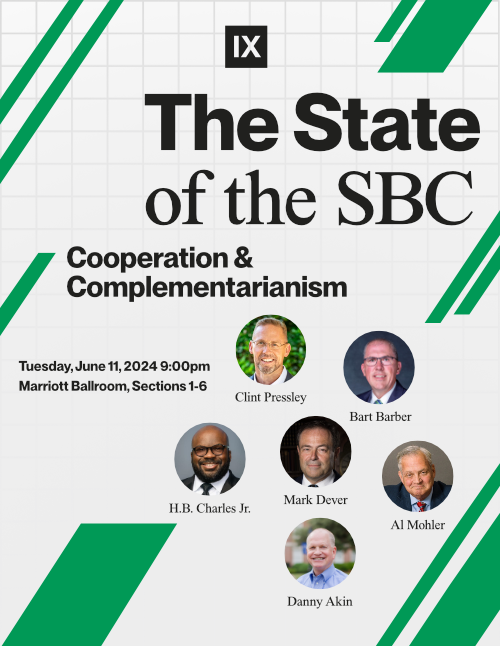Book Review: Evangelism as Exiles
Elliott Clark, Evangelism as Exiles: Life on Mission as Strangers in our Land. The Gospel Coalition, 2019. 157 pp.
The American church has a problem.
She just can’t give up the idea that success and prosperity are what God ought to give her. Even we who strongly denounce the prosperity gospel, are drawn to the idea that growth and influence is inevitable for the faithful. “If you build it, they will come,” truly is a national slogan. We so easily assume if we do the Christian life right, then the people will come. If we do church right, then the church will grow. If we are faithful in just the right way, the culture will respect and listen to us.
The problem with such thinking has nothing to do with wanting big churches, a transformed culture, or many people saved by God. The problem is the underlying assumption that America, with all of its noble aspirations, is somehow supposed to be a home to Christians. As it becomes increasingly clear that we don’t actually belong in America, we aren’t welcome in the public square, and our beliefs are considered bigoted and backwards, we are easily tempted to discouragement and fearfulness. Elliot Clark diagnoses the problem: “the mere potential of such shame, the possibility of being made an outsider, hinders me from practicing bold evangelism” (33).
Elliot Clark’s Evangelism as Exiles critiques precisely that idea, in order to encourage the church toward faithful evangelism in a culture increasingly hostile to the faith. Our identity as Christians in this world is one of chosen exiles. Having a proper sense of that identity is fundamental to living as faithful witnesses in a world hostile to the gospel. Clark sketches a description of our identity as exiles and sojourners, and demonstrates how it grounds and informs the Christian mission.
WHAT’S IT ABOUT?
Evangelism as Exiles utilizes 1 Peter’s counsel to Christians who are “elect exiles” as the framework for living as faithful witnesses. After encouraging Christians to embrace their identity as exiles in this world (1 Pet. 1:1-2), he grounds that identity in the hope of our glorious home to come (1 Pet. 3:15). He points out why we ought to fear God more than man, yet also to show respect towards all (1 Pet. 1:17; 2:13–17). He helpfully describes evangelism as a confident declaration of God and his worthiness of all praise and worship (1 Pet. 2:9–10). He describes how living distinctively Christian lives, especially in hardship and opposition, proclaims the beauty of Christ (1 Pet. 2:11–12). And he concludes meditating on the beauty of the family of God—the promise that we enjoy a taste of our heavenly home even in this life, and how wonderfully powerful that gospel community is as a witness to the gospel (1 Pet. 4:8–10).
FAITHFUL EVANGELISM AND THE SOVEREIGNTY OF GOD
One of the most rewarding elements of the book is his encouraging illustrations sprinkled throughout, taken from Clark’s experiences proclaiming the gospel in a Muslim country. Because many Western believers perceive the Muslim world to be one of the hardest places to be a faithful Christian, Clark’s illustrations demonstrate the power of bold and gracious declaration, patient confidence in God’s work, and loving, hospitable lives.
One of the more convicting portions of this book was Clark’s critique of our euphemistic description of evangelism (94–97). Clark rightly reminds his reader to be careful of using language that implicitly catechizes us to look only for those interested in receiving the gospel. If we believe in God’s sovereignty—if we believe God can act like he does in the Bible—then we don’t need to wait for someone who wants what we’re sharing. We can boldly announce the gospel, warn people they must repent and believe, and be confident that God is able to save even those who are opposed to the gospel.
Lastly, many Christians are often a little embarrassed to talk too much about heaven and the hope of glory. It feels a little ‘pie-in-the-sky;’ a little too removed from reality. But Clark (channeling the Apostle Peter) helps his reader meditate on the wonderful hope we have, and how that serves as an engine for confident, gracious proclamation of the gospel in our lives in this world. “We need to hear and believe the promise of our future exaltation in order to overcome the threat of shame and disgrace that would silence our witness” (33).
EVANGELISM AND THE LOCAL CHURCH
Many Christians struggle to include other Christians in their evangelistic efforts. Most Christians would think of bringing their non-Christian friends to a church service; but inviting a fellow member to get to know and invest in their friends is often treated as somehow cheating. My friends are my responsibilities. We are often discouraged in our evangelism because we act like it’s a spiritual discipline we must do by ourselves for it to count for anything. That thinking is wrong, and fails to recognize the evangelistic effectiveness of a community committed to living faithfully together.
Perhaps because most of Clark’s illustrations come from his and his family’s own experience in evangelizing in a context where there were not established local churches, it could be easy to walk away from this book with that mentality reinforced. Though he speaks about the beauty of hospitality as an encouragement to converts who have lost the support of their families and surrounding community (chapter 13), even that feels focused on what you and your family can provide. A greater emphasis on the encouragement we are provided through living life as exiles together as Christians would make this an even more helpful tool.
BUY IT, READ IT, GIVE IT AWAY
Elliot Clark’s book is a gift to Christians tempted to feel discouraged by their increased sense of alienation in America. More than that, it is a clarion call to confidently declare the gospel in a world that desperately needs it. A book this encouraging and convicting on evangelism is a must-have for pastors to read and give away liberally.







